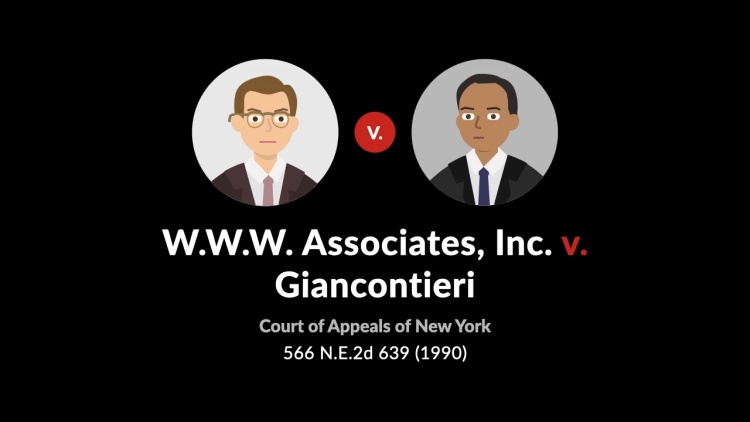W.W.W. Associates, Inc. v. Giancontieri
New York Court of Appeals
77 N.Y.2d 157, 566 N.E.2d 639 (1990)
- Written by Jamie Milne, JD
Facts
Frank Giancontieri and others (the property owners) (defendants) owned two acres of land in New York. They contracted to sell that land to property developer W.W.W. Associates (W.W.W.) (plaintiff). The land was subject to pending litigation. The sales contract contained a reciprocal cancellation provision stating that if the litigation was not resolved by a specified date, then either party could cancel the contract. The contract also contained a merger clause stating that the contract was the parties’ full agreement and that no party was relying on statements other than those expressed in the contract. As the date triggering the cancellation provision neared, W.W.W. filed a suit against the property owners, seeking specific performance of the sales contract. However, once the trigger date passed, the property owners notified W.W.W. that they were canceling the transaction. The property owners then sought summary judgment dismissing the suit for specific performance, arguing that the contract expressly gave them the right to cancel. W.W.W. countered that the parties intended the cancellation provision to be exercisable only by W.W.W. and offered an affidavit from W.W.W.’s vice president regarding that aspect of the parties’ negotiations. The trial court dismissed the suit, holding that the agreement unambiguously gave the property owners the right to cancel. The appeals court reversed, granting specific performance. The property owners then appealed to the New York Court of Appeals.
Rule of Law
Issue
Holding and Reasoning (Kaye, J.)
What to do next…
Here's why 905,000 law students have relied on our case briefs:
- Written by law professors and practitioners, not other law students. 47,100 briefs, keyed to 995 casebooks. Top-notch customer support.
- The right amount of information, includes the facts, issues, rule of law, holding and reasoning, and any concurrences and dissents.
- Access in your classes, works on your mobile and tablet. Massive library of related video lessons and high quality multiple-choice questions.
- Easy to use, uniform format for every case brief. Written in plain English, not in legalese. Our briefs summarize and simplify; they don’t just repeat the court’s language.






